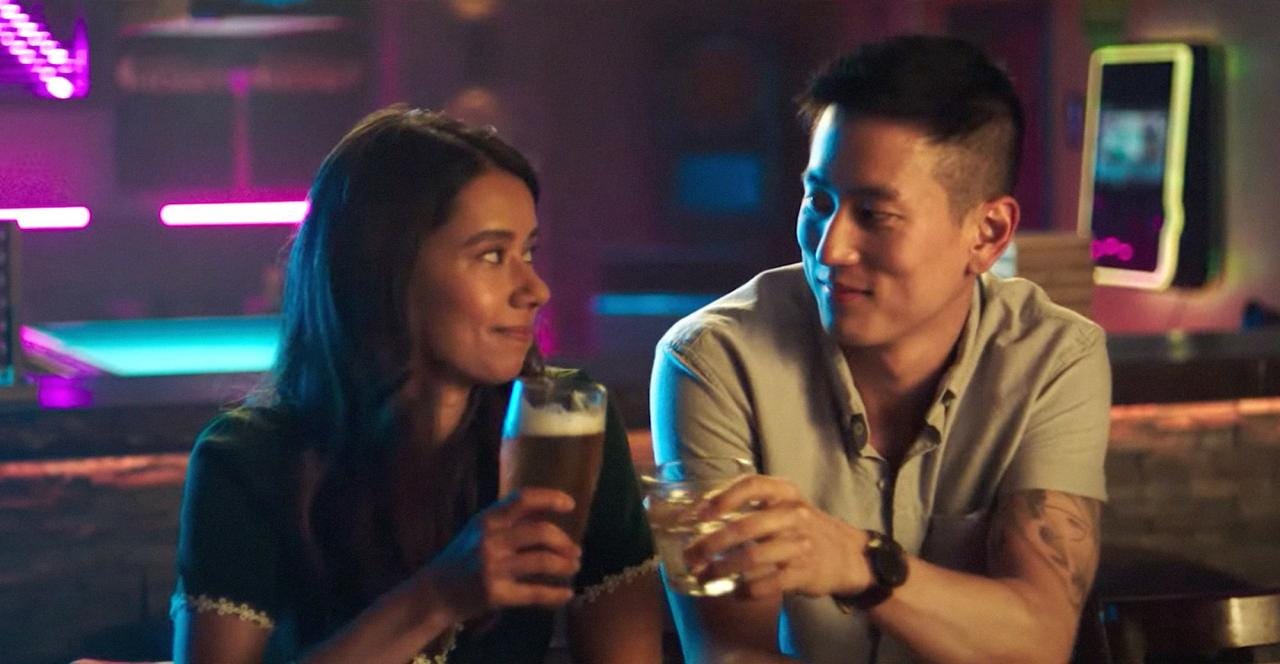Anyone who has ever been to prison will appreciate “Definition, Please”, as this is one of those movies about someone with unfulfilled potential. In this case, it’s writer-director-star Sujata Day (clearly NOT an underarchiever to judge by those hyphens) as Monica, a former Spelling Bee champion who has grown up to be… just a girl. She still lives at home, she is unlucky in love and work, and now she’s got to deal with a problem she thought she had dodged her entire life – a dashing, successful brother who is returning home to help with their ailing mother.
Monica is kind of a punching bag for everyone else in the story, but it’s not a jokey character. She holds her own and remains proud of her life, even if it didn’t add up to what was expected. Jason Bateman’s execrable “Bad Words” featured a similar character who curdled in adulthood, so it’s nice that in this film Monica is not angry at the world, or vulgar to the ones who care, or generally socially incompetent. “Definition, Please” is an easygoing movie, but at no point does it adopt take the simpler path.
It’s reasonable to assume we know there this will go – Monica will meet a man, learn to find confidence within herself, and everyone will cheer her on during the expected loss of her mother (which then allows her to connect with her roots – she is Indian). What happens instead is unexpected. Monica is a little neurotic but really mostly well-adjusted. The surprise is her superstar brother, who seems to be the favorite of all the grandmas in the neighborhood, is not well-adjusted. And gradually, Monica has to figure out what exactly is wrong with him, and how to possibly help, or at least seek help. “Definition, Please” thus spins out from a generic comedic vein into something a bit more human and thoughtful.
I had never seen Day before, though apparently she popped up in Netflix’s “I Think You Should Leave”. This is not a comedic showcase as much as it’s a dramatic one, though the frankly-gorgeous Day has a few moments that showcase her sharp timing and comedic look of disappointment. Hollywood offers so few opportunities for women of Indian descent, but I see no reason Day shouldn’t be getting scores of offers, particularly to write and direct her own material. Her credits actually speak for herself — she’s been a mainstay in dozens of television shows over the years, and her name is at least out there. She also has a number of film credits, but it appears that most of them are shorts. Her name is out there, guys. Hire her.
Therapy becomes a major throughline for this film, but it wasn’t much on my mind in prison. I figured, I had never seen a therapist before, so why not here? At my first institution, they had several therapists. But they were there to facilitate more serious cases. It’s not easy to be seen when you wish when there are people who are mandated to sit with the docs. I was there for years, as my priority level dropped considerably.
At my later, smaller institution, I found out the Mental Health Department was operated entirely by one man. There was only group therapy. If you wished to seek extra help, they had therapy VHS’s about all sorts of addictions and dependencies. That head of the Mental Heath Department ran group therapy, but a lot of that work was done by videos. Every time I saw him walking around the institution, he appeared to be jaunty, as if he had no worries in the world. Maybe it was true. Later, he was named the Correctional Officer Of The Year within my institution, so he had to be doing something right.






I want to see this. Seems wholly relatable. Thanks for highlighting this film.